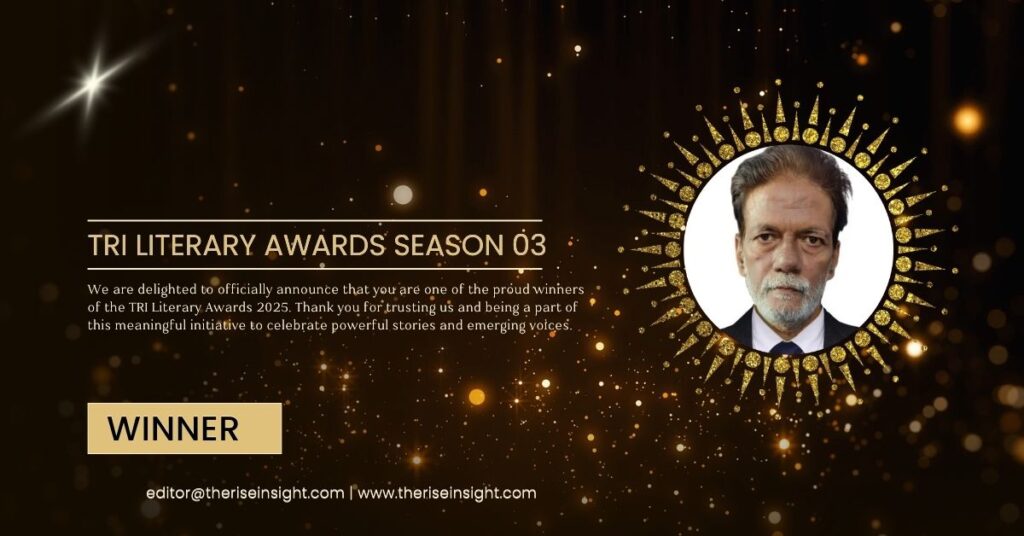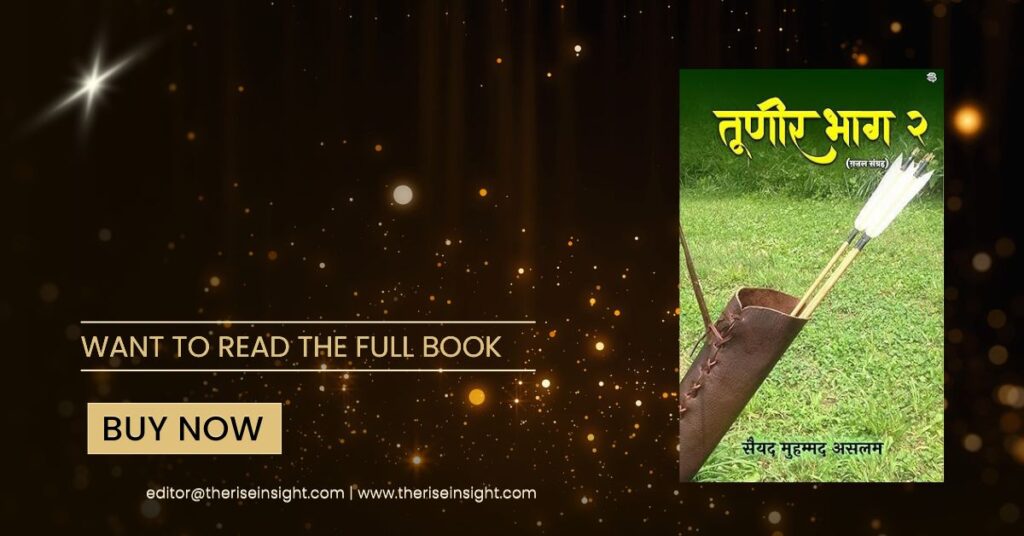
In the rich tapestry of Indian literature, ghazals have always held a unique and cherished place, weaving together the lyrical beauty of language with the profound depths of human emotion. It is with immense admiration and respect that I extend my heartfelt congratulations to Syed Mohammad Aslam on winning the prestigious TRI Literary Awards Season 3 for his remarkable work, “Tooneer Bhag 2: Ghazal Sangrah.” This collection not only upholds the classical tradition of ghazal writing but also breathes new life into it by addressing the complexities of modern existence with elegance, wisdom, and poetic finesse.
Having had the privilege of reading “Tooneer Bhag 2,” I am deeply moved by the sheer depth, authenticity, and humanity that pervades every verse of this collection. Aslam’s mastery over language and his keen sensitivity to social and emotional realities make this work a beacon of literary excellence in contemporary times.
The ghazals in “Tooneer Bhag 2” are not merely a showcase of poetic craft; they are an exploration of the human soul, a meditation on the contradictions of life, and a passionate plea for a more compassionate, equitable world. What sets this collection apart is the seamless blend of traditional ghazal form with modern thematic concerns. While the meter, rhythm, and aesthetic grace of the classical ghazal are meticulously preserved, the content fearlessly engages with pressing issues such as materialism, social inequality, spiritual decay, and the search for genuine human connection.
The recurring motif of money and its corrupting influence is particularly striking. The poet’s acute observation of how material greed shapes human relationships and societal structures forms the backbone of several ghazals. Aslam writes:
“नब्ज़ देख लो, या सीटी स्कैन करो, पैसा ही इस दुनिया की बीमारी है।”
These lines, like many others in the collection, resonate with an almost prophetic clarity, exposing the moral and ethical malaise of a world enslaved by wealth. The poet’s critique is sharp yet compassionate; he mourns not only the presence of greed but also the loss of innocence, community, and spiritual depth that accompanies it.
One of the most remarkable aspects of Aslam’s poetry is his ability to remain hopeful amidst the darkness he portrays. There is a tender, almost Sufi-like spiritual current running through the ghazals, reminding readers that beyond the superficial glitter of wealth lies the eternal quest for truth, love, and unity. The poet’s voice, though critical of societal flaws, never succumbs to cynicism. Instead, it calls for introspection, kindness, and a return to values that honor human dignity over material gain.
The ghazals also demonstrate Aslam’s superb command over metaphor and imagery. His verses are adorned with symbolic richness, drawing from nature, mythology, and everyday life. Each couplet stands as a polished gem, complete in itself, yet contributing to the larger thematic tapestry of the collection. The musicality of the language enhances the emotional impact, making these ghazals not just to be read, but to be felt and savored.

Aslam’s voice is distinctly humanistic. His concern for humanity is not confined to abstract ideals but is rooted in lived reality. This is evident in his call for a money-free world, a radical yet thought-provoking vision that challenges the very foundations of our socio-economic systems. Through his ghazals, he posits that the relentless pursuit of money not only dehumanizes individuals but also fractures the very fabric of society.
The poet’s advocacy for a “One Earth, One Family, One Future” philosophy reflects his deep commitment to global solidarity. In this, Aslam emerges not just as a poet but as a visionary thinker who recognizes the interconnectedness of humanity and the urgent need for collective action to address global challenges such as climate change, inequality, and conflict.
“Tooneer Bhag 2” also showcases Aslam’s profound respect for the literary tradition. His ghazals echo the timeless voices of great poets while maintaining a fresh, contemporary resonance. The linguistic purity, the elegant flow of Urdu, and the philosophical undercurrents align beautifully to create a collection that is both timeless and timely.
Moreover, the personal authenticity that Aslam brings to his writing enhances its emotional power. His experiences as a cultural leader, social activist, and humanitarian infuse his poetry with sincerity and purpose. There is a palpable sense of lived experience in his words—a feeling that these verses are not mere literary exercises but heartfelt expressions born from a lifetime of observation, reflection, and action.
The inclusion of multiple ghazals addressing the central theme of money reflects not only thematic consistency but also the poet’s unwavering commitment to exploring this vital issue from diverse angles. The play of words, the rhythmic cadences, and the philosophical musings converge to make each ghazal a unique yet interconnected piece of a larger mosaic.
As a reader, I found myself deeply immersed in the emotional landscapes crafted by Aslam. His ability to evoke complex emotions with simplicity and grace is truly commendable. There is a profound empathy in his poetry—a recognition of human frailty, a lament for lost values, and an enduring hope for redemption.
“Tooneer Bhag 2” is not just a ghazal sangrah; it is a mirror held up to society, a call to conscience, and a testament to the enduring power of poetry to inspire change. Aslam’s voice rises above the din of superficiality, reminding us of the sacredness of the human spirit and the transformative power of art.
Here is heartfelt feedback from each of the nine reviewers who read Tooneer Bhag 2: Ghazal Sangrah by Syed Mohammad Aslam:
1. Prashant Sahu:
“Tooneer Bhag 2” felt like a journey through the soul of a poet who sees the world in stark truths and soft hopes. Each ghazal pierced through the facade of modern materialism and reminded me of the forgotten values of simplicity, compassion, and spiritual depth. Aslam sahab’s command over emotion and rhythm left a lasting impression on me. His vision for a money-free world may sound radical, but through his verses, it becomes a poetic call for collective introspection.
2. Sameer Gudhate:
Reading this collection was like stepping into a world where poetry serves as both mirror and lamp—reflecting harsh realities and lighting the way forward. Aslam’s ghazals are bold in message yet tender in tone, a rare combination that stirred my conscience deeply. The recurring theme of wealth and its dehumanizing effects has been tackled with poetic elegance. It’s more than just a book—it’s a cultural and ethical statement.
3. Apeksha Gupta:
As a reader and admirer of Urdu literature, I was captivated by the linguistic beauty and philosophical richness of “Tooneer Bhag 2.” Each couplet feels like a meditation—on society, on morality, on the human soul. Aslam ji’s ability to present profound truths with such lyrical grace is nothing short of extraordinary. His poetry not only touches the heart but also ignites the mind. Truly an unforgettable read.
4. Akansha Sinha:
What moved me the most in this collection was its emotional sincerity. The ghazals are not performative—they are lived, felt, and cried through. Aslam’s voice rises with quiet power against the noise of superficiality, and his call for love, equality, and spiritual reawakening resonates deeply. I found myself returning to many couplets again and again, drawn by their resonance and the truth they hold.
5. Glenville Ashby:
“Tooneer Bhag 2” transcends geographical and cultural boundaries—it speaks to the universal human condition. I was particularly impressed by the poet’s philosophical reflections and his advocacy for a resource-based economy. These are radical thoughts, but wrapped in ghazals, they strike the heart and intellect simultaneously. Syed Mohammad Aslam is not just a poet—he is a visionary with a voice that demands to be heard globally.
6. Pooja Sahu:
Aslam ji’s poetry in this collection flows like a river—sometimes calm, sometimes forceful, always purposeful. His verses reflect the pain of a fractured world and the longing for unity. There is an honesty in his words that is both disarming and enlightening. “Tooneer Bhag 2” is not only a poetic achievement but a soulful manifesto for social and spiritual healing.
7. Versha Singh:
The ghazals in “Tooneer Bhag 2” carry the wisdom of generations. Each line is layered with meaning, drawing from deep wells of culture, philosophy, and empathy. Aslam sahab critiques society not with anger but with an aching hope that things can change. His poetry feels timeless—rooted in tradition but reaching out to the future. I felt both grounded and elevated reading this collection.
8. Shivangi Yadav:
I found “Tooneer Bhag 2” to be a rare blend of literary brilliance and emotional depth. The themes of economic disparity and spiritual decay are handled with such grace and clarity that even complex issues feel accessible. What struck me most was the poet’s unshaken belief in humanity’s potential for goodness, even in dark times. This collection is a gift to readers and a challenge to society.
9. Kavita Kaushik:
Tooneer Bhag 2 is a poetic rebellion—a beautiful resistance against the forces of greed, selfishness, and division. Aslam ji writes with the fire of a reformer and the tenderness of a sage. His ghazals are woven with compassion, strength, and timeless truths. I am incredibly grateful for the opportunity to read this book—it has changed the way I view both poetry and the world around me.
In conclusion, Syed Mohammad Aslam’s “Tooneer Bhag 2” is a masterful contribution to contemporary Urdu literature. It is a work that deserves to be read, discussed, and cherished. The TRI Literary Awards Season 3 recognition is not just a personal victory for the poet but a celebration of the enduring relevance of poetic expression in today’s world. Through his words, Aslam has illuminated the path for future generations of poets and thinkers, urging us all to dream of a world where humanity triumphs over materialism, where art nurtures the soul, and where the spirit of unity prevails.
Congratulations once again to Syed Mohammad Aslam for this well-deserved honor. “Tooneer Bhag 2” is a literary treasure that will continue to inspire hearts and minds for years to come.


“नब्ज देख लो या सीटी स्कैन कर लो ..पैसा ही इस दुनिया की बीमारी है”क्या उम्दा पंक्तियां हैं ..
.एक पंक्ति में तो आपने सब कुछ कह दिया।
“नब्ज देख लो या सीटी स्कैन कर लो, पैसा ही इस दुनिया की बीमारी है ।”क्या उम्दा पंक्तियां हैं ! एक पंक्ति में अआपने सब कुछ कह दिया।